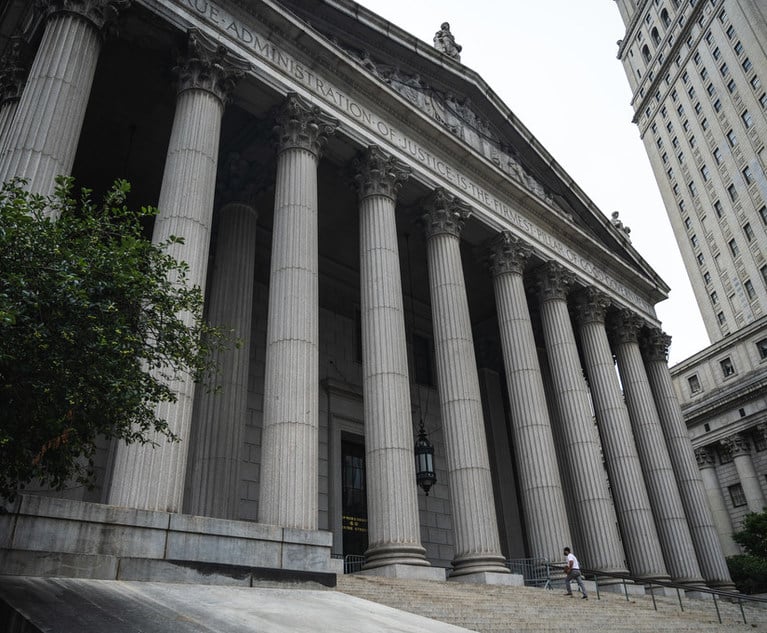US Chamber Pushes Rule to Expose Litigation Funding
Pointing to a rise in the use of outside financiers in lawsuits, the U.S. Chamber of Commerce is petitioning the federal judiciary to adopt a nationwide disclosure requirement for third-party litigation funding.
June 02, 2017 at 03:52 PM
7 minute read
The original version of this story was published on National Law Journal
Pointing to a rise in the use of outside financiers in lawsuits, the U.S. Chamber of Commerce is petitioning the federal judiciary to adopt a nationwide disclosure requirement for third-party litigation funding.
In a June 1 letter, Lisa Rickard, president of the Chamber's Institute for Legal Reform, and more than two dozen other business organizations ask the Administrative Office of the U.S. Courts to add a provision to the Federal Rules of Civil Procedure that would require disclosure of all compensation agreements that are “contingent on, and sourced from, any proceeds of the civil action, by settlement, judgment or otherwise.”
“Absent disclosure requirements, TPLF [third-party litigation funding] will continue to operate in the shadows, concealing from the court and other parties in each case the identity of what is effectively a real party in interest that may be steering a plaintiff's litigation strategy and settlement decisions,” wrote Rickard.
♦ READ MORE — Taking Bets: The Rise of Commercial Litigation Funding
Such a “lack of transparency” could lead to conflicts of interest, particularly if the funders are publicly traded companies whose shareholders include judges, attorneys or jurors, she wrote.
Travis Lenkner, managing director of New York-based funder Burford Capital, called the petition a “carbon copy” of a 2014 Chamber proposal that failed to make headway before the same rulemaking committee. He predicted the same outcome this time around.
“The reason this is unlikely to succeed and is as much a public relations ploy as a legitimate public policy is because it is so broad as to be impossible to administer,” he said. “The points in favor of it are points addressed already by other rules. And the industry, which is growing, is still such a small, tiny part of the litigation system that federal rules exist to govern.”
Matthew Harrison, investment manager and legal counsel at Bentham IMF in San Francisco, echoed those arguments. He also noted that the committee, in rejecting the Chamber's earlier proposal, had discussed whether such a rule was necessary.
“Judges have the power to require disclosure of funding when it's relevant in the case,” he said.
Much has changed since 2014 when it comes to litigation funding, the Chamber noted in its letter. The Northern District of California adopted a rule in January requiring disclosure of outside funding in class actions, the first such rule in the nation. And in March, the U.S. House of Representatives passed the Fairness in Class Action Litigation Act of 2017, which mandates a similar funding disclosure requirement.
Burford and Bentham IMF initially opposed a proposal in the Northern District of California until it was limited to class actions.
In 2014, the rules committee said a rule was premature given that litigation funding was still new and evolving. That's no longer the case, Rickard wrote, citing record income at several funders, including Burford and Bentham. More law firms also are using outside funders, which have expanded from financing individual lawsuits to portfolios of cases and now include crowdfunding online marketplaces such as LexShares and Trial Funder Inc.
“The industry has grown tremendously,” said Page Faulk, vice president of legal reform initiatives at the Chamber's institute. “There have been a lot of developments since we originally submitted the petition, and we're also hearing from other business groups about their concerns.”
More judges now share those concerns, she said. And she noted that the Chamber in 2014 had been joined by four other groups while, this time, more than two dozen organizations have teamed up in support of its proposal, including DRI-The Voice of the Defense Bar, Lawyers for Civil Justice, the Product Liability Advisory Council and the American Tort Reform Association.
“In three years, a lot has changed,” Faulk said. “We feel very positive.”
Copyright the National Law Journal. All rights reserved. This material may not be published, broadcast, rewritten, or redistributed.
Pointing to a rise in the use of outside financiers in lawsuits, the U.S. Chamber of Commerce is petitioning the federal judiciary to adopt a nationwide disclosure requirement for third-party litigation funding.
In a June 1 letter, Lisa Rickard, president of the Chamber's Institute for Legal Reform, and more than two dozen other business organizations ask the Administrative Office of the U.S. Courts to add a provision to the Federal Rules of Civil Procedure that would require disclosure of all compensation agreements that are “contingent on, and sourced from, any proceeds of the civil action, by settlement, judgment or otherwise.”
“Absent disclosure requirements, TPLF [third-party litigation funding] will continue to operate in the shadows, concealing from the court and other parties in each case the identity of what is effectively a real party in interest that may be steering a plaintiff's litigation strategy and settlement decisions,” wrote Rickard.
♦ READ MORE — Taking Bets: The Rise of Commercial Litigation Funding
Such a “lack of transparency” could lead to conflicts of interest, particularly if the funders are publicly traded companies whose shareholders include judges, attorneys or jurors, she wrote.
Travis Lenkner, managing director of New York-based funder Burford Capital, called the petition a “carbon copy” of a 2014 Chamber proposal that failed to make headway before the same rulemaking committee. He predicted the same outcome this time around.
“The reason this is unlikely to succeed and is as much a public relations ploy as a legitimate public policy is because it is so broad as to be impossible to administer,” he said. “The points in favor of it are points addressed already by other rules. And the industry, which is growing, is still such a small, tiny part of the litigation system that federal rules exist to govern.”
Matthew Harrison, investment manager and legal counsel at Bentham IMF in San Francisco, echoed those arguments. He also noted that the committee, in rejecting the Chamber's earlier proposal, had discussed whether such a rule was necessary.
“Judges have the power to require disclosure of funding when it's relevant in the case,” he said.
Much has changed since 2014 when it comes to litigation funding, the Chamber noted in its letter. The Northern District of California adopted a rule in January requiring disclosure of outside funding in class actions, the first such rule in the nation. And in March, the U.S. House of Representatives passed the Fairness in Class Action Litigation Act of 2017, which mandates a similar funding disclosure requirement.
Burford and Bentham IMF initially opposed a proposal in the Northern District of California until it was limited to class actions.
In 2014, the rules committee said a rule was premature given that litigation funding was still new and evolving. That's no longer the case, Rickard wrote, citing record income at several funders, including Burford and Bentham. More law firms also are using outside funders, which have expanded from financing individual lawsuits to portfolios of cases and now include crowdfunding online marketplaces such as LexShares and Trial Funder Inc.
“The industry has grown tremendously,” said Page Faulk, vice president of legal reform initiatives at the Chamber's institute. “There have been a lot of developments since we originally submitted the petition, and we're also hearing from other business groups about their concerns.”
More judges now share those concerns, she said. And she noted that the Chamber in 2014 had been joined by four other groups while, this time, more than two dozen organizations have teamed up in support of its proposal, including DRI-The Voice of the Defense Bar, Lawyers for Civil Justice, the Product Liability Advisory Council and the American Tort Reform Association.
“In three years, a lot has changed,” Faulk said. “We feel very positive.”
Copyright the National Law Journal. All rights reserved. This material may not be published, broadcast, rewritten, or redistributed.
This content has been archived. It is available through our partners, LexisNexis® and Bloomberg Law.
To view this content, please continue to their sites.
Not a Lexis Subscriber?
Subscribe Now
Not a Bloomberg Law Subscriber?
Subscribe Now
NOT FOR REPRINT
© 2025 ALM Global, LLC, All Rights Reserved. Request academic re-use from www.copyright.com. All other uses, submit a request to [email protected]. For more information visit Asset & Logo Licensing.
You Might Like
View All

Litigation Trends to Watch From Law.com Radar: Suits Strike at DEI Policies, 'Meme Coins' and Infractions in Cannabis Labeling
4 minute read

Trending Stories
Who Got The Work
J. Brugh Lower of Gibbons has entered an appearance for industrial equipment supplier Devco Corporation in a pending trademark infringement lawsuit. The suit, accusing the defendant of selling knock-off Graco products, was filed Dec. 18 in New Jersey District Court by Rivkin Radler on behalf of Graco Inc. and Graco Minnesota. The case, assigned to U.S. District Judge Zahid N. Quraishi, is 3:24-cv-11294, Graco Inc. et al v. Devco Corporation.
Who Got The Work
Rebecca Maller-Stein and Kent A. Yalowitz of Arnold & Porter Kaye Scholer have entered their appearances for Hanaco Venture Capital and its executives, Lior Prosor and David Frankel, in a pending securities lawsuit. The action, filed on Dec. 24 in New York Southern District Court by Zell, Aron & Co. on behalf of Goldeneye Advisors, accuses the defendants of negligently and fraudulently managing the plaintiff's $1 million investment. The case, assigned to U.S. District Judge Vernon S. Broderick, is 1:24-cv-09918, Goldeneye Advisors, LLC v. Hanaco Venture Capital, Ltd. et al.
Who Got The Work
Attorneys from A&O Shearman has stepped in as defense counsel for Toronto-Dominion Bank and other defendants in a pending securities class action. The suit, filed Dec. 11 in New York Southern District Court by Bleichmar Fonti & Auld, accuses the defendants of concealing the bank's 'pervasive' deficiencies in regards to its compliance with the Bank Secrecy Act and the quality of its anti-money laundering controls. The case, assigned to U.S. District Judge Arun Subramanian, is 1:24-cv-09445, Gonzalez v. The Toronto-Dominion Bank et al.
Who Got The Work
Crown Castle International, a Pennsylvania company providing shared communications infrastructure, has turned to Luke D. Wolf of Gordon Rees Scully Mansukhani to fend off a pending breach-of-contract lawsuit. The court action, filed Nov. 25 in Michigan Eastern District Court by Hooper Hathaway PC on behalf of The Town Residences LLC, accuses Crown Castle of failing to transfer approximately $30,000 in utility payments from T-Mobile in breach of a roof-top lease and assignment agreement. The case, assigned to U.S. District Judge Susan K. Declercq, is 2:24-cv-13131, The Town Residences LLC v. T-Mobile US, Inc. et al.
Who Got The Work
Wilfred P. Coronato and Daniel M. Schwartz of McCarter & English have stepped in as defense counsel to Electrolux Home Products Inc. in a pending product liability lawsuit. The court action, filed Nov. 26 in New York Eastern District Court by Poulos Lopiccolo PC and Nagel Rice LLP on behalf of David Stern, alleges that the defendant's refrigerators’ drawers and shelving repeatedly break and fall apart within months after purchase. The case, assigned to U.S. District Judge Joan M. Azrack, is 2:24-cv-08204, Stern v. Electrolux Home Products, Inc.
Featured Firms
Law Offices of Gary Martin Hays & Associates, P.C.
(470) 294-1674
Law Offices of Mark E. Salomone
(857) 444-6468
Smith & Hassler
(713) 739-1250








